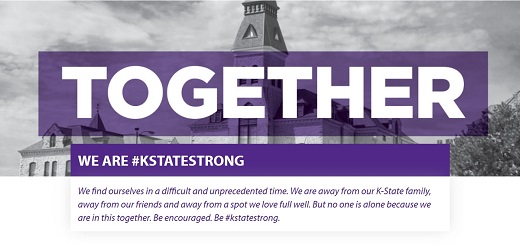05/13/20
K-State Current - May 13, 2020
K-State Current is a weekly news update for the Kansas Board of Regents to apprise the Regents on a few of the many successes and achievements made by K-State faculty, staff and students.
K-State News
Visit K-State’s “We Are #KStateStrong” site to view brief videos designed to keep the K-State family engaged, connected and inspired during these challenging times.
K-State keeping rural, urban Kansans on the forefront of COVID-19 knowledge
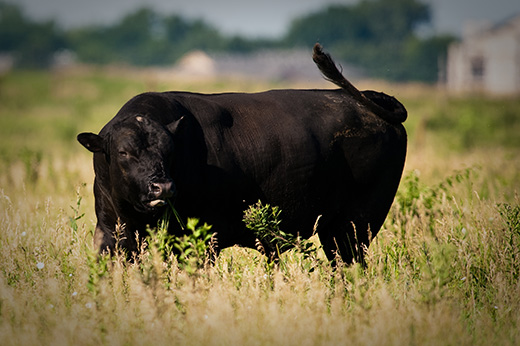 Kansas State University is helping families in Kansas by arming them with new research, information, tools and outreach during the COVID-19 pandemic. From health and safety in meatpacking plants to food security and economic and mental health resources, K-State is taking a multifaceted approach to assist Kansans.
Kansas State University is helping families in Kansas by arming them with new research, information, tools and outreach during the COVID-19 pandemic. From health and safety in meatpacking plants to food security and economic and mental health resources, K-State is taking a multifaceted approach to assist Kansans.
"As the land-grant university, it is our mission to support the state and its people not only through education but also research, engagement and service," said Peter K. Dorhout, vice president for research. "Agriculture is the largest economic industry in the state, and I am proud of the work our entire university is doing to help all Kansans, but especially those in this vital industry."
Help for the livestock industry
Joel DeRouchey, professor of animal sciences and industry, says the current situation has affected all aspects of the livestock industry.
"The reduction in cattle and swine processing within the packing industry has forced many producers to retain animals on their operations that would have been marketed to processors on a normal schedule," DeRouchey said.
The K-State animal sciences and industry department is directly aiding producers by discussing modifications to feed and management practices, working with producers on ration formulations and how to reduce feed costs. The department also is working with veterinarians across the state and advising producers who are holding animals until the market turns around on best practices for keeping those animals healthy.
Randall Phebus, professor of animal sciences with 30 years of experience working with meat processing facilities, says he is talking regularly with contacts in the meat and poultry industries to understand the challenges they are facing and the importance for research on personnel safety, food safety, and food and agricultural security as they try to maintain and meat processing operations.
"It comes down to sharing information between facilities, public health officials, researchers and the people running the facilities," Phebus said. "And that's where I think K-State can really step up. To be able to help the agriculture production and food processing sectors is like a calling for us researchers."
Glynn Tonsor, professor of agricultural economics, says the Kansas economy is directly and substantially impacted by anything that alters the agricultural economy and this is even more true when the livestock sector and the effects of COVID-19 are considered more narrowly.
"I am doing my best to provide information that aids in decision-making," Tonsor said. "Ultimately, I hope my efforts provide economic context and information that enables tough decisions to be more guided and less influenced by emotion."
The agricultural economics department is maintaining and updating K-State's AgManager site, which includes valuable resources for the livestock community as well as others in the agricultural sector, including:
- Analysis of the Institute for Health Metrics and Evaluation of COVID-19 Forecasting Model.
- Feeder cattle risk management tool.
- Meat availability and shortages overview.
- A fact sheet summarizing the situation of fed cattle marketing and overflow volumes given reduced meatpacking plant capacity.
- Guidance on the agricultural provisions in the CARES act.
- Assessing Impact of Packing Plant Utilization on Livestock Prices, a fact sheet estimating how a reduction in packing plant capacity would impact fed cattle and market hog prices.
"The land-grant mission is still what drives this college and university," said J. Ernest Minton, dean of the College of Agriculture and director of K-State Research and Extension. "During this pandemic, our faculty, staff and community leaders have been working tirelessly finding and sharing solutions to address the needs of ag producers, businesses and industries across the state and around the world in ways that sustain us through this situation and even help us come back stronger when it ends. I've never been more proud of our team for their skill, sheer will and determination."
Serving mental health needs
The K-State Family Center, the clinic of the couple and family therapy program in the College of Health and Human Sciences, prepared to serve its clients via telehealth when the university moved to reduced operations.
"The circumstances surrounding Covid-19 are difficult for many people," said Marcie Lechtenberg, clinic director and clinical assistant professor. "Financial stress, child care and school issues, concerns about health, grief over canceled events and activities, and increasing social isolation are just a few of the things that can place a strain on relationships and individual mental health. The couple and family therapy program recognized that it was of critical importance we offer our therapy services via telehealth and make sure those services are financially feasible for our clients."
Telehealth services have been used to serve clients since March 23 and the clinic has provided more than 430 hours of therapy to individuals, couples and families to date. All graduate students and faculty are now helping clients online.
The clinic operates on a sliding fee scale and clients' fees can be adjusted because of decreased income. New clients may schedule an appointment through the Family Center website, hhs.k-state.edu/familycenter, or by calling the clinic at 785-532-6984.
Other timely resources
- "Agriculture Today," a radio program and podcast produced by the College of Agriculture and K-State Research and Extension, covers timely topics and distributes research as well as new ideas and information.
- Webinars and a YouTube channel with informational videos help keep Kansans up to date on topics such as farm finance and recommended alternatives to conducting scheduled prescribed burns of Conservation Reserve Program acreage because of the COVID-19 situation. The webinars have been viewed more than 4,000 times and videos on the YouTube channel currently have more than 6,000 views.
"I think the current situation will change the way our department works in terms of extension and sharing information," said Allen Featherstone, professor and head of the agricultural economics department. "We always had the ability to distribute the information this way, but now there is a demand, so it makes sense that we would continue."
The Center for Engagement and Community Development is helping ensure Kansans in all communities have continued access to healthy foods during this time.
"Many small-town grocery stores have seen an increase in their sales since COVID," said David Procter, director of the center. "People are trying to stay close to home, so when you have a small town that has lost its grocery store this becomes a real problem."
The center is part of the Rural Grocery Initiative and is a resource for all grocery store owners in Kansas. The center provides funding as well as technical and informational assistance through the Kansas Healthy Food Initiative. This assistance is primarily for improving access to healthy food and can include such things as upgrading a store's online sales system.
A new Facebook page for grocery store owners has also been developed by the center. The group allows owners to ask specific questions of not just those at K-State, but also other store owners. A webinar featuring the owner of the Circle K Market in Holton will also be available on the site and will allow others to learn what the store has been doing to continue meeting the needs of the Holton community at this time.
"We want to let grocery store owners know that we at Kansas State University stand ready to assist them either through informational resources or financial assistance," Procter said.
President Myers receives national award for service, patriotism
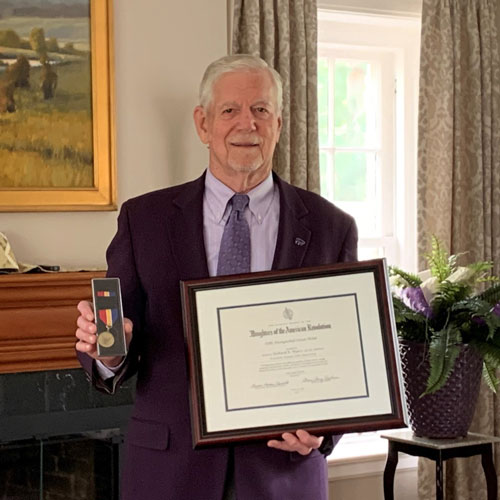 Kansas State University President Richard B. Myers is the recipient of the DAR Distinguished Citizen Medal from the Polly Ogden Chapter of the National Society of the Daughters of the American Revolution. The national award is presented to an individual who fulfills the qualities of honor, service, courage, leadership and patriotism.
Kansas State University President Richard B. Myers is the recipient of the DAR Distinguished Citizen Medal from the Polly Ogden Chapter of the National Society of the Daughters of the American Revolution. The national award is presented to an individual who fulfills the qualities of honor, service, courage, leadership and patriotism.
Myers' distinguished career has revolved around service. He has served his country in wartime, his nation in crisis, and the future leaders of his community and nation through his role in higher education.
A four-star general in the U.S. Air Force, Myers served as the 15th chairman of the Joint Chiefs of Staff from 2001-2005. As chairman, he was the highest-ranking uniformed officer of the U.S. military forces. Before becoming chairman, Myers served as vice chair of the Joint Chiefs for 18 months.
As chair, he was the principal military advisor to the president, secretary of defense and the National Security Council during the earliest stages of the War on Terror, including planning and execution of the 2003 invasion of Iraq. Myers is the author of "Eyes on the Horizon: Serving on the Front Lines of National Security."
A native Kansan, Myers began serving as the interim president of his alma mater, Kansas State University, in April 2016, and was announced as the permanent president on Nov. 15, 2016. He graduated from the university in 1965 with a bachelor's degree in mechanical engineering and joined the Air Force through K-State's ROTC program.
K-State Faculty Highlights
Chemical engineer working to unlock the role of hydrogen sulfide for treatment of disease
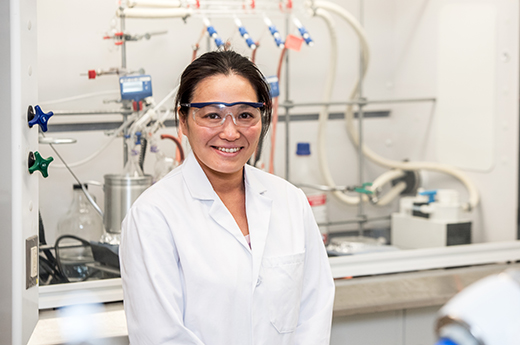 Funded by a National Science Foundation CAREER award, a Kansas State University chemical engineering professor is taking on the challenge of discovering new treatments for diseases such as Alzheimer's and cancer.
Funded by a National Science Foundation CAREER award, a Kansas State University chemical engineering professor is taking on the challenge of discovering new treatments for diseases such as Alzheimer's and cancer.
The more than $500,000 research grant will support Urara Hasegawa, assistant professor in the Tim Taylor Department of Chemical Engineering and Warren and Gisela Kennedy Keystone research scholar, in her project "Understanding the biological functions of the gasotransmitter hydrogen sulfide using a polymer engineering approach."
Hydrogen sulfide, or H2S, is an essential molecule in the human body. Accumulating evidence suggests it may play an important role in cancer, brain diseases such as Alzheimer's disease, and heart disease.
"What has been missing, however, is an in-depth understanding of this molecule's function," Hasewaga said. "Unlocking that key could lead to the development of novel therapeutic approaches to these diseases."
The project, by incorporating chemical engineering and polymer science techniques, will develop tools to advance the fundamental understanding of H2S in the human body.
"The NSF-funded activities will provide outstanding educational and research opportunities in biomaterials science, inspire students at all levels to develop career paths in this important field and contribute to the educational mission of K-State," Hasegawa said.
National Science Foundation CAREER awards are given in support of junior faculty who exemplify the role of teacher-scholars through research, education and the integration of education and research within the context of the mission of their organizations. The award comes with a federal grant for research and education activities for five consecutive years.
Architecture professor awarded residency at prestigious I-Park
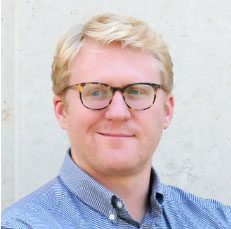 Grant Alford, assistant professor of architecture in the College of Architecture, Planning & Design, or APDesign, has been awarded a 2020 artist-in-residence at the I-Park Foundation in East Haddam, Connecticut. The residency is a fully funded four-week stay at the foundation's property in Connecticut where they provide room and board and dedicated studio space. Due to the COVID-19 pandemic, the residency will take place in summer 2021.
Grant Alford, assistant professor of architecture in the College of Architecture, Planning & Design, or APDesign, has been awarded a 2020 artist-in-residence at the I-Park Foundation in East Haddam, Connecticut. The residency is a fully funded four-week stay at the foundation's property in Connecticut where they provide room and board and dedicated studio space. Due to the COVID-19 pandemic, the residency will take place in summer 2021.
I-Park is both an open-air and a closed-studio laboratory for individual creative pursuits in the fields of music composition/sound art, the visual arts, architecture, moving image, creative writing and landscape/garden/ecological design. From insights developed in the laboratory setting, it also develops and sponsors specially themed cross-disciplinary projects of cultural significance and brings these discoveries to light in the public domain.
Alford's project proposal, "New Forms and Non-form for Digital Architectural Drawing," will produce a series of drawings exploring techniques of digital painting as architectural drawing.
I-Park supports these individual and collaborative investigations through its international artists-in-residence program, the aesthetic engagement of its natural and built environments and with on-site exhibitions, performances and collegial exchanges.
Since its founding in 2001, I-Park has sponsored more than 900 fully-funded residencies.
Alford teaches design studio at various levels as well as seminars on digital culture in architecture. He is an NCARB-certified architect registered in Texas. He has worked at award-winning firms in New York, New Jersey and Texas, and his independent work has been recognized nationally.
Alford's current research interests include rhetoric and meaning in architectural form and new media in two-dimensional architectural representation. Geometry, projected drawing and diagramming also figure largely in his work and teaching.
He graduated with honors from Texas Tech University in 2005 and earned his professional Master of Architecture from Princeton University in 2008.
K-State Student News
Veterinary student receives top exotic animal medicine scholarship
 Tori Matta, second-year veterinary student at the Kansas State University College of Veterinary Medicine, has received the $2,500 first-place scholarship award from ZuPreem, a Kansas-based manufacturer of food for zoo animals and specialty pets.
Tori Matta, second-year veterinary student at the Kansas State University College of Veterinary Medicine, has received the $2,500 first-place scholarship award from ZuPreem, a Kansas-based manufacturer of food for zoo animals and specialty pets.
Eligibility for the scholarship requires being enrolled at a U.S.- or Canadian-accredited veterinary school. Student applicants must be entering their second, third or fourth year in 2020 and interested in pursuing specialization in one of the fields of exotic animal veterinary medicine.
Zupreem provides $5,000 overall in annual scholarships to veterinary students interested in exotic animal medicine. The second-place award is $1,500 and third place is for $1,000. As the first-place recipient, Matta also receives an all-expenses-paid trip to the 2020 ExoticsCon in Denver, Colorado, scheduled Aug. 29-Sept. 3.
"I learned about this scholarship through the Exotic Animal Medicine Club at K-State," said Matta, who is from Manhattan. "My career aspiration is to become an exotic/zoo/wildlife veterinarian. This scholarship provides a tremendous opportunity to network and learn from professionals in my desired field at the 2020 ExoticsCon. I am fortunate to have amazing mentors such as Dr. James Carpenter and Dr. David Eshar, K-State veterinary faculty, to help me pursue my career goals."
Matta is a 2014 graduate of Manhattan High School. She earned a bachelor's degree in biology from K-State in 2018.
